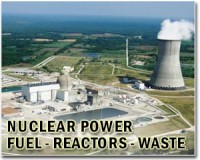 |
Washington DC (SPX) Nov 18, 2009 If Congress and the states do not follow the lead of Wall Street in declining to underwrite financially "risky and uneconomic" new nuclear reactors, the resulting taxpayer-backed loan guarantees and other subsidies could pave the way for the same kind of industry-wide meltdown that happened in the 1970s and 1980s, according to a major new study by Dr. Mark Cooper, a senior fellow for economic analysis at the Institute for Energy and the Environment at Vermont Law School. Titled "All Risk, No Reward for Taxpayers and Ratepayers," the new study by Dr. Cooper looks at the reasons that Wall Street is shunning the financing of new reactors and concludes that Congress and state lawmakers would be well-advised to follow the same course to avoid leaving taxpayers and ratepayers holding the bag in the form of failed loan guarantees and needlessly higher utility bills. A repeat of the financial fiasco of the 1970s and1980s would be devastating. During that period, ratepayers and taxpayers were saddled with billions in extra costs when the industry was crippled: half of the reactors ordered were cancelled or abandoned; those reactors that were completed took, on average, twice as long to build as originally planned and cost twice as much as originally estimated; four-fifths of the utilities that undertook nuclear construction suffered large financial downgrades and all suffered substantial financial distress; and investments in new reactors resulted in spectacular bankruptcies of both investor-owned and publicly-owned utilities. As the Cooper study notes: "The last time the nuclear industry circumvented the judgment of the marketplace, it resulted in what Forbes magazine called the 'largest managerial failure in American history. The past could be the prologue." Commenting on the study, Dr. Cooper said: "It is ironic that at a moment when the nation has suffered mightily from the misallocation of the cost of risk in the financial sector, some of the strongest supporters of free markets and critics of government-sponsored enterprises, would urge another massive federal subsidy intended to circumvent the judgment of the capital markets and put another multi-billion dollar program of federal support onto the backs of the American people as taxpayers and ratepayers." The Cooper report notes: "The rejection of new reactors by financial markets is not a case of market failure, it is an example of market success, markets properly assessing risk and acting accordingly by refusing to underwrite unacceptable risks." Based on a review of recent Wall Street and consultant pronouncements on the risks of new reactors, the report identifies and quantifies with new data six types of risks that reactors face in today's economic climate (technology, policy, regulatory, execution, marketplace and financial). It concludes that the risk of new reactors is already high and that the expected increases in costs will be substantial: + The reactor projects are far too large to be a prudent investment for utilities - as much as 20 times the size of what a reasonable investment should be - which will have an impact on their financial ratings; + The utilities that have proposed projects are having severe difficulties finding neighboring utilities to partner in the project and share the risk; + Government agencies that have looked at the risk of the loan guarantees have concluded that half the projects could go bad and half the investment in those projects could be lost; + Utility consultants recommend that the equity owners demand a rate of return that is twice the norm for utilities to be compensated for the severe risk of these projects. + Delays and downgrading of financial ratings have already begun, long before concrete has been poured, which is where the construction and rework problems are most severe. By attempting to circumvent the sound judgment of capital markets, advocates of loan guarantees and construction work in progress (ratepayer fees for constructing reactors before they are licensed) claim that they lower the financing costs of new reactors and are good for consumers, but shifting risk does not eliminate it and subsidies induce utilities and regulators to do things that will cost taxpayers and ratepayers dearly. When utilities choose an option that is not the least-cost option available, it raises the cost. The existence of numerous lower-cost, lower-risk options to meet the need for electricity in a low-carbon environment undercuts the claim that nuclear power is the solution to the externality problem of climate change. Share This Article With Planet Earth
Related Links Full text of the new report by Dr. Cooper Nuclear Power News - Nuclear Science, Nuclear Technology Powering The World in the 21st Century at Energy-Daily.com
 Electricity-hungry Vietnam looks to join nuclear club
Electricity-hungry Vietnam looks to join nuclear clubHanoi (AFP) Nov 17, 2009 Vietnam is expected to take a key step towards meeting its burgeoning appetite for electricity by paving the way for its first nuclear power plant, but debate is still raging over the controversial project. Parliament in the fast-growing communist state is set to vote at the end of November on the project -- which lawmakers have been mulling for more than a decade -- after legalising the ... read more |
|
| The content herein, unless otherwise known to be public domain, are Copyright 1995-2009 - SpaceDaily. AFP and UPI Wire Stories are copyright Agence France-Presse and United Press International. ESA Portal Reports are copyright European Space Agency. All NASA sourced material is public domain. Additional copyrights may apply in whole or part to other bona fide parties. Advertising does not imply endorsement,agreement or approval of any opinions, statements or information provided by SpaceDaily on any Web page published or hosted by SpaceDaily. Privacy Statement |